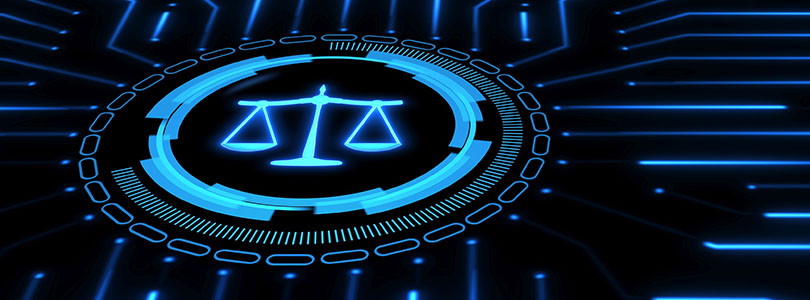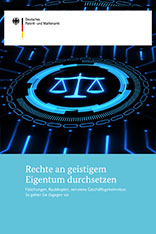Content
Counterfeits, fakes: DPMA informs about the enforcement of IP rights

Losses of billions of euros, reduction of jobs, safety risks: Product piracy causes massive damage to industry and society – A new brochure of the German Patent und Trade Mark Office informs companies about how to protect and defend themselves against product piracy
Press release of 14 May 2024
Munich. Wristwatches, micro-components of medical devices or designs of industrial machines – in almost all industrial sectors, criminal organisations put counterfeit products on the market. The annual damage caused by product piracy amounts to billions of euros. The infringement of IP rights undermines innovations and investments, destroys jobs, involves risks to an individual’s health and to the environment – and, unless it is punished, it can induce others to counterfeit. The German Patent and Trade Mark Office (DPMA) informs about how producers and authors can prevent infringements and enforce their rights. Our new brochure "Enforcement of IP rights - How to take action against counterfeits, fakes and the betrayal of business secrets" provides a concise overview.
"We aim to inform creative companies about instruments to enforce their rights and thus help them defend themselves against product pirates," DPMA President Eva Schewior says, adding: "We are aware that small and medium-sized enterprises comparatively rarely take action against infringements of IP rights. If they let fakes and counterfeits pass, they literally lose money, accept that their innovations and investments are undermined – and may even risk their existence." According to the DPMA President, the good reputation of companies will suffer too if consumers are disappointed after unknowingly buying a counterfeit product of poor quality. "The damage to the image is an economic factor that should not be underestimated," she stresses.
Studies: Reduction of jobs, inexperienced consumers, serious safety risks
According to a study conducted by the European Union Intellectual Property Office (EUIPO) and the Organisation for Economic Co-operation and Development (OECD), up to 5.8% of all goods imported into the EU in 2019 were counterfeited or produced without permission. According to the EUIPO, product piracy causes an annual damage of up to 16 billion euros in the European Union, putting 200,000 jobs at risk in the clothing, consumer goods and toy sectors alone.
Despite the enormous damage and significant risks, a lot of people buy counterfeit products: In a study conducted by the EUIPO last year, 12% of respondents stated that they had knowingly bought fakes of branded products. Buying counterfeit products is particularly common among young people. In the Intellectual Property and Youth Scoreboard 2022, more than half (52%) of the EU citizens aged 15 to 24 answered that in the previous year, they had knowingly or accidentally bought at least one counterfeit product via the Internet.
This makes many companies suffer, not only those in the consumer goods sector: In a study carried out by the Fraunhofer Institute for Applied and Integrated Security AISEC for the German Mechanical Engineering Industry Association (VDMA), 46% of companies stated that they had been affected by illegal reproductions, copies and similar fakes. According to the study, most counterfeits concerned components and designs. In 42% of the cases, the counterfeits came from big, professional gangs. Compared to the previous survey, this figure increased considerably. The risk plagiarism poses to people and equipment is significant: 41% of the companies referred to counterfeits that involved risks for operators or users. More than half of respondents (54%) considered the detected fakes a risk to the safe operation of their system.
Effective enforcement of IP rights: What does the new DPMA brochure offer?
Patents, utility models, trade marks and designs and copyright are of vital importance to the fight against counterfeiting. Yet, IP rights grant exclusivity only if their proprietors consistently enforce them, i.e. defend themselves against infringements. Written warnings, injunctive reliefs, actions: The new brochure contains information on what those affected can do if industrial property rights, copyright or business secrets are infringed.
But how does an organisation become aware that fakes of its branded products circulate? The brochure raises awareness of the necessity to continuously monitor the market – e.g. by looking for bargain offers in online shops or by taking a look at new products presented at trade fairs. And it gives an overview of options provided by civil and criminal law to all those affected by IP infringements. Furthermore, the brochure outlines ADR procedures, such as those offered by the World Intellectual Property Organization (WIPO), the European Union Intellectual Property Office (EUIPO) and other public authorities or officially recognised public bodies.
The German Patent and Trade Mark Office
Inventiveness and creativity need effective protection. The DPMA is the German centre of expertise for all intellectual property rights – patents, utility models, trade marks and designs. As the largest national patent office in Europe and the fifth largest national patent office in the world, our office stands for the future of Germany as a country of inventors in a globalised economy. Its staff of just under 2,800 at three locations – Munich, Jena and Berlin – provide services to inventors and companies. They implement federal innovation strategies and develop the national, European and international protection systems.
Picture 1: iStock.com/dmitrynogaev
Last updated: 14 May 2024


Not only protecting innovations
Social Media